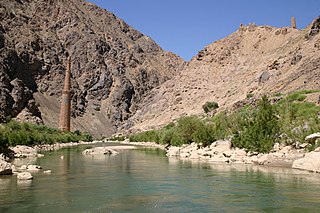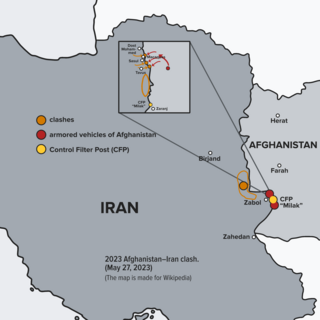
The Hari River or Herat River or Tejen River is a river flowing 1,100 kilometres (680 mi) from the mountains of central Afghanistan to Turkmenistan, where it forms the Tejen oasis and disappears in the Karakum Desert. In its lower course, the river forms a northern part of the border between Afghanistan and Iran, and a southeastern part of the border between Turkmenistan and Iran.

Mohammad Ashraf Ghani Ahmadzai is an Afghan former politician, academic, and economist who served as the president of Afghanistan from September 2014 until August 2021, when his government was overthrown by the Taliban.

The Panjdeh Incident was an armed engagement between the Emirate of Afghanistan and the Russian Empire in 1885 that led to a diplomatic crisis between Great Britain and the Russian Empire regarding the Russian expansion south-eastwards towards the Emirate of Afghanistan and the British Raj (India). After nearly completing the Russian conquest of Central Asia, the Russians captured an Afghan border fort, threatening British interests in the area. Seeing this as a threat to India, Britain prepared for war but both sides backed down and the matter was settled diplomatically. The incident halted further Russian expansion in Asia, except for the Pamir Mountains, and resulted in the definition of the north-western border of Afghanistan.
The Ghurian District is an Afghan administrative district (Wuleswali) in far western Afghanistan in western Herat Province. The district is bordered by Iran to the west and northwest. It is then bordered by other districts of Herat, Kohsan District in the north, Zendeh Jan District to the east, and Adraskan District to the south. The Hari River flows through the northeastern end of the district. The border with Iran is marshy. The population is 85,900 and the district center is the city of Ghurian.

Relations between Afghanistan and Iran were established in 1935 during King Zahir Shah's reign and the Shah of Iran Reza Shah Pahlavi, though ties between the two countries have existed for millennia. As a result, many Afghans speak Persian, as Dari is one of the official languages of Afghanistan, and many in Afghanistan also celebrate Nowruz, the Persian New Year.

Afghanistan–India relations are the diplomatic relations between India and Afghanistan. They had been historical neighbors and shared cultural ties through Bollywood and cricket.
Afghan-India Friendship Dam (AIFD), formerly Salma Dam, is a hydroelectric and irrigation dam project located on the Hari River in Chishti Sharif District of Herat Province in western Afghanistan. The Afghan cabinet had renamed the Salma Dam to the Afghan-India Friendship Dam to express gratitude to India, which funded and helped with completing the partially constructed project.
Afghans in Iran are citizens of Afghanistan who are temporarily residing in Iran as refugees or asylum seekers. They form the largest percent of the Afghan diaspora. The first wave of Afghans were admitted to Iran after the start of the Soviet–Afghan War in 1979.
On 3 October 2013, a boat carrying migrants from Libya to Italy sank off the Italian island of Lampedusa. It was reported that the boat had sailed from Misrata, Libya, but that many of the migrants were originally from Eritrea, Somalia and Ghana. An emergency response involving the Italian Coast Guard resulted in the rescue of 155 survivors. On 12 October it was reported that the confirmed death toll after searching the boat was 359, but that further bodies were still missing; a figure of "more than 360" deaths was later reported.

Jaish ul-Adl, or Jaish al-Adl, is a Sunni militant and Baluchi separatist organization that operates mainly in southeastern Iran, where there is a substantial concentration of Sunni Baluchis and a porous border with Pakistan.

This is a timeline of the European migrant crisis of 2015 and 2016.

Proactiva Open Arms (POA) is a Spanish NGO devoted to search and rescue (SAR) at sea. Set up in October 2015, it carried out its first rescue action that same month from its base on the Greek island of Lesbos. As well as maintaining a permanent base on Lesbos, the NGO carries out its rescue operations from three ships, a sailing yacht Astral, the Golfo Azzurro and Open Arms.

The Greece–Turkey border is around 200 kilometres (120 mi) long, and separates Western Thrace in Greece from East Thrace in Turkey.
Events in the year 2020 in Afghanistan.

The 2021 Taliban offensive was a military offensive by the Taliban insurgent group and allied militants led to the fall of the Kabul-based Islamic Republic of Afghanistan and the end of the nearly 20-year War in Afghanistan that had begun following the United States invasion of the country. The Taliban victory had widespread domestic and international ramifications regarding human rights and proliferation of terrorism. The offensive included a continuation of the bottom-up succession of negotiated or paid surrenders to the Taliban from the village level upwards that started following the February 2020 US–Taliban deal.
Since at least 2008, Greece has pushed back tens of thousands of migrants, especially at the Evros border with Turkey and in the Aegean Sea. On land, the pushbacks involve taking people who have arrived at the Greek side of the border and transferring them to the Turkish side; most cases involve some form of abuse. Maritime pushbacks typically involve taking migrants who have either entered Greek territorial waters or landed on Greek islands and depositing them in Turkish territorial waters on craft without any means of propulsion. The number of pushbacks has increased following the European migrant crisis and breakdown in EU–Turkey relations in 2020. This incident occurred as a result of Turkey ceasing to prevent migrants from leaving for the European Union in February 2020, and in some instances actively encouraging them.
On 24 November 2021, an inflatable dinghy carrying migrants from France to the United Kingdom capsized in the English Channel causing the deaths of 27 of the 30 people on board. It is believed to be the deadliest incident in the English Channel since the International Organization for Migration began collecting data in 2014.

The 2021 Afghanistan–Iran clashes took place between the Islamic Emirate Armed Forces and the Iranian Border Guard Command along checkpoints on the Afghanistan–Iran border. The clashes occurred on the 1st of December, the cross-border fighting saw troops of the Islamic Emirate of Afghanistan capture several checkpoints on the Iranian side of the international border. The clashes ended later that day, after the two sides promptly came to an agreement that saw the Taliban force withdraw from all captured Iranian territory. Iran and the Islamic Emirate of Afghanistan subsequently referred to the incident as a "misunderstanding" and denied suffering any casualties, while various media reports reported casualties on both sides.

On 27 May 2023, Armed Forces of the Islamic Emirate of Afghanistan and Iranian border guards clashed along the Afghanistan–Iran border between the Afghan Nimruz Province and the Iranian Sistan and Baluchestan Province. After a brief clash, the two sides de-escalated the situation.












